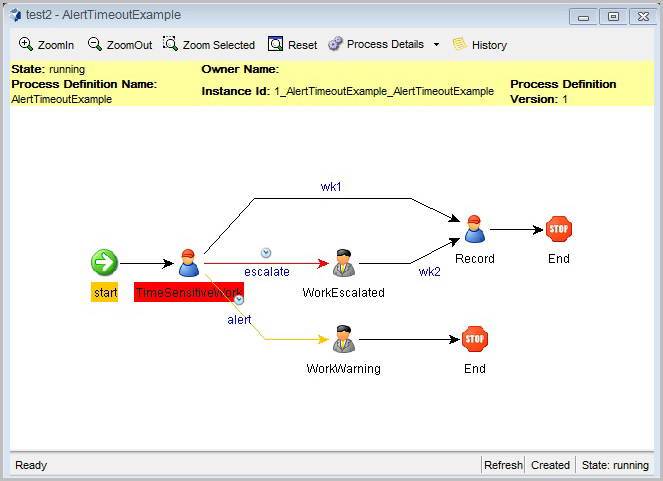18.15 Process Management
Process management allows you to view the incident’s progress in the workflow or terminate a workflow process.
Process execution is the time period during which the process is operational, with process instances being created and managed.
When an iTRAC process is executed or instantiated in the iTRAC server, a process instance is created, managed, and eventually terminated by the iTRAC server in accordance with the process definition. As the process progresses towards completion or termination, it executes various activities defined in the workflow template based on the criteria for the transitions between them. The iTRAC workflow server processes manual and automatic steps differently.
An iTRAC process must be created with a single associated incident; there is therefore a one-to-one match between iTRAC processes and incidents. Not all incidents are attached to a process. Only one incident can be associated to an iTRAC process instance.
18.15.1 Instantiating a Process
An iTRAC process can be instantiated in the iTRAC server by associating an incident to an iTRAC process by any of the following three methods
-
Associating an iTRAC process to the incident at the time of incident creation
-
Associating an iTRAC process to incident after an incident has been created
-
Associating an iTRAC process to an incident through correlation
For more information on associating a process to an incident, see Section 17.0, Configuring Incidents.
18.15.2 Automatic Step Execution
When the process instance executes an automatic activity step, command step, or mail step, it executes the associated activity or command defined in the template and stores the result in process variables. It then transitions to the next step in the iTRAC template.
For example, an activity might be defined to ping a server. When this activity is executed in a workflow process, the activity runs and attaches the results to the associated incident.
18.15.3 Manual Step Execution
On encountering a manual step, the iTRAC server sends out notifications in the form of work items to the assigned resource. If the step was assigned to a role, a work item is sent to all users within the role. The iTRAC server then waits for the user to complete the work item before proceeding to the next activity.
For more information, see Understanding the Work Item Summary Interface.
18.15.4 Display Status
The Display Status option monitors the progress of a process. As the process instance progresses from one activity, the user can track the progress visually by clicking the Refresh button. The process monitor also provides an audit trail of all the actions performed by the iTRAC server when executing the process.
Activities that are running, completed, or terminated are represented by the following icons.
Table 18-3 Display Status Icons
|
Icon |
Description |
|---|---|

|
Indicates that the activity is running. |

|
Indicates that the activity is completed. |

|
Indicates that the activity is terminated. |
18.15.5 Displaying the Status of a Process
-
Access the Sentinel Control Center. For more information, see Step 1 in Accessing the iTRAC Administration Tools.
-
Click the iTRAC tab.
-
In the toolbar, click iTRAC > Display Process Manager.
-
Click the down-arrow on the Switch Views button to select a view or create a new view.
-
In the Process Manager window, right-click a process, then select Actions > Display Status.
The current step is highlighted in red.

-
To close, click the X in the upper right corner.
18.15.6 Changing Views in Process Manager
-
Access the Sentinel Control Center. For more information, see Step 1 in Accessing the iTRAC Administration Tools.
-
Click the iTRAC tab.
-
In the toolbar, click iTRAC > Display Process Manager.
-
Click the Manage View drop-down list, then select Edit Current View.
-
Change the following options to change your current view:
-
Fields
-
Group by
-
Sort
-
Filter
-
Leaf Attribute
-
-
Click Apply, then click Save.
18.15.7 Starting or Terminating a Process
-
Access the Sentinel Control Center. For more information, see Step 1 in Accessing the iTRAC Administration Tools.
-
Click the iTRAC tab.
-
In the toolbar, click iTRAC > Display Process Manager.
-
In the Process View Manager window, right-click a process, then select Actions > Start Process or Terminate Process.